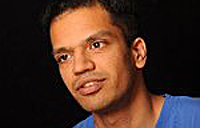York postdoctoral fellow Amar Vutha has been awarded one of 10 new prestigious Society in Science – Branco Weiss Fellowships worldwide that will allow him to conduct research toward developing a compact and portable atomic clock.
Why is that important? As Vutha says, “Presently, small atomic clocks on satellites are crucial for navigation systems like GPS. They are also used for generating accurate atomic time by national labs, like the National Research Council in Ottawa. My research will hopefully aid in the development of next-generation portable clocks.” He says these clocks will also be “useful for timekeeping and satellite navigation. They could also be used in field research in geophysics, as they are very sensitive to the effects of gravity.”

Although an actual device is still years away, and so too a “radically improved GPS,” Vutha says, “The physics and engineering of these devices will be interesting and challenging.”
Why is it interesting? Atomic clocks use the precise and unchanging “vibrations” of atoms to generate regular ticks, says Vutha, of York’s Department of Physics and Astronomy in the Faculty of Science.
“I find it beautiful that these regular properties of atoms can be used build useful devices. A further intriguing notion is that, because gravity affects the passage of time, we can use such precise clocks to get some insight into gravitational forces. So this is fun engineering, with the promise of exciting physics at the end.”
Up to 10 Society in Science – Branco Weiss Fellowships are awarded yearly to outstanding postdoctoral researchers, scientists with a proven track record, by the Swiss Federal Institute of Technology. It provides a grant that will allow Vutha up to five years of complete academic freedom to do interdisciplinary research at any institution in the world.
“Experimental research can get expensive, and it is not always easy to make do with borrowed equipment and pocket money. Funding agencies usually only give grants to professors at universities, which is why the Branco Weiss Fellowship is unique,” says Vutha. “The fellowship will also give me a way to collaborate with, and learn from, research groups around the world. I am delighted to have the means to pursue my ideas and turn them into tangible things.”
This year’s new fellows come from a large variety of fields, including atomic physics, behavioural ecology, engineering, evolutionary biology, international law, medicine, neuro-imaging, primatology, RNA genomics, robotics and social neuroscience. They come from Belgium, Canada, China, Estonia, India, Italy, Portugal, Switzerland and the United States.


